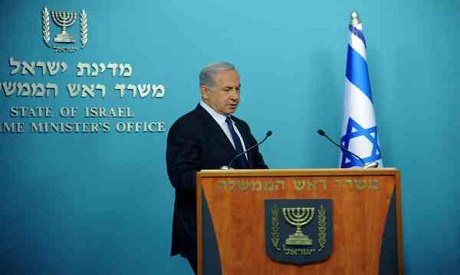
Israel's Prime Minister Benjamin Netanyahu arrives to make statements during a press conference at the prime minister's office in Jerusalem, Wednesday, April 1, 2015 (Photo: AP)
Israel's Prime Minister Benjamin Netanyahu lined up talks with security chiefs Friday after Iran and world powers signed the outlines of a landmark nuclear deal despite strong Israeli opposition.
Officials slammed Thursday's announcement in Lausanne of a framework accord as a "historic mistake", warning that if implemented it would jeopardise Israel's very existence.
Local media said Netanyahu called a meeting of his security cabinet and senior officials from Israel's security services.
"The prime minister will hold security consultations," an aide told AFP.
Government spokesman Mark Regev told reporters in Jerusalem that the path to a permanent deal agreed in Switzerland was "a very, very dangerous direction".
"This is a bad deal not just for Israel, this is a bad deal for the region and for the world," he told AFP.
"Iran's nuclear programme doesn't just threaten my country, Iran's nuclear programme threatens the peace and the security of the world."
The framework deal clinched by Iran and the so-called P5+1 group of nations marked a significant breakthrough in a 12-year stand off between Tehran and world powers over its nuclear programme.
Under the outline agreement, Iran agreed to sharply curtail its uranium enrichment capacity in return for the lifting of punitive sanctions that have crippled the country's economy.
Regev quoted Netanyahu as saying that the deal as it appears to be emerging "would not block Iran's path to the bomb. It would pave it".
"It would increase the risks of nuclear proliferation and the risks of a horrific war," he tweeted late Thursday.
Tehran has denied seeking a nuclear weapon but Israel has repeatedly warned that Iran's ability to obtain a bomb would endanger the entire region.
Israel is the Middle East's sole, albeit unacknowledged, nuclear power.
Repeating previous Israeli warnings, Intelligence Minister Yuval Steinitz said Thursday that all options were open.
"If we have no choice, we have no choice ... the military option is on the table," he said.
Netanyahu travelled to Washington last month and addressed the US Congress, where he laid out Israel's concerns at an emerging world deal with Iran.
The trip infuriated the White House and plunged US-Israeli relations to their frostiest for years.
Shortly after the outline of the deal was revealed, Israeli government officials slammed it as "a historic mistake which will make the world far more dangerous".
"It is a bad framework which will lead to a bad and dangerous agreement," they said on condition of anonymity.
Under the deal, Iran's stocks of highly enriched uranium will be cut by 98 percent for 15 years, while its unfinished Arak reactor will not produce weapons-grade plutonium.
The P5+1 group -- the United States, Britain, China, France and Russia plus Germany -- hope that this, along with a reduction in its uranium centrifuge numbers, will make it virtually impossible for Iran to produce nuclear weapons.
Israeli media was divided over the accord, with an opinion piece in the daily Haaretz calling it "not a bad deal at all".
"Iran perhaps scored some victories in terms of the narrative... but the world powers made significant achievements of their own on the real practical issues," Haaretz said.
The Jerusalem Post, in an article by British journalist Melanie Phillips, however, said the continuation of talks towards a lasting deal was a "terrifying situation".
"The US has been prepared to allow a regime that is openly pursuing America's destruction and the annihilation of Israel to achieve nuclear weapons breakout capacity," she wrote.
Short link: